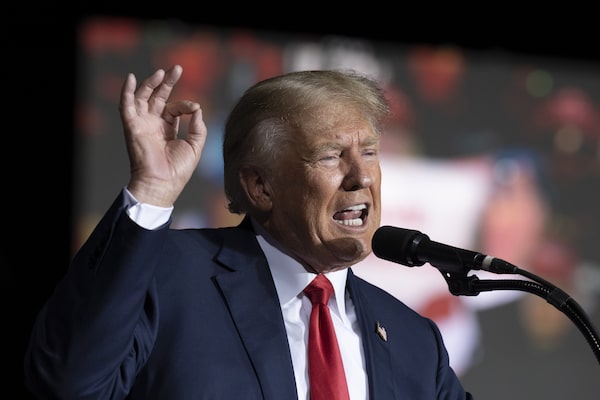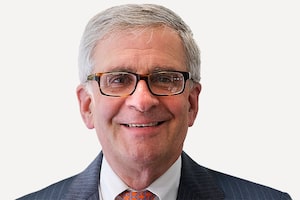
Former U.S. President Donald Trump speaks at the Minden Tahoe Airport in Minden, Nev., on Oct. 8.José Luis Villegas/The Associated Press
He criticized a former Republican president, George H.W. Bush, and survived. He pilloried a one-time GOP presidential nominee and military hero, John McCain, and flourished. He took on another Republican nominee, Mitt Romney, and emerged unscathed. He suggested that the father of a 2016 Republican nomination rival, Ted Cruz, was involved in the assassination of John F. Kennedy and still got an Oval Office picture with the Cruz children. He denounced the leader of the Republicans in the House of Representatives, Kevin McCarthy, and beamed as the Californian became a supplicant.
Now, Donald Trump faces his sixth – maybe his 16th, perhaps even his 60th – test in a real-life version of reality-TV-style political survival.
A revolution may not be a dinner party – an aphorism coined by Mao Zedong in 1927 – but almost a century later Mr. Trump is learning that a dinner party with antisemites may have the power to upend a dominant political figure.
There is a long history of portentous American meals preceding Mr. Trump’s fateful one with Ye, the rapper once known as Kanye West, and Nick Fuentes, an online evangelist of white supremacy.
There was the breakfast when George Washington explained the thinking behind the creation of the Senate to Thomas Jefferson; the Fourth of July salmon lunch that eased tensions between civil-rights leader Jesse Jackson and presumptive 1988 Democratic presidential nominee Michael Dukakis; and the 1962 White House dinner when Mr. Kennedy saluted Nobel Prize winners, including future prime minister Lester B. Pearson, by calling the event “the most extraordinary collection of talent, of human knowledge, that has ever been gathered together at the White House, with the possible exception of when Thomas Jefferson dined alone.”
But the repast Mr. Trump held with two extremists may be the meal with the most consequence for U.S. politics. Indeed, it may turn out to be Mr. Trump’s last supper.
There are mounting indications that, in the phrase made popular by the 1991 Hollywood memoir of film producer Julia Phillips, the 45th president may never eat lunch in Washington again.
The dinner with the twin heralds of hatred unleashed a chorus of criticism from almost every corner of U.S. politics. The censure from Jewish groups and Democrats was expected and unexceptional. But what stood out was the condemnation from Republicans who apparently have grown weary of averting their eyes from the abominations that seem to spring from Mr. Trump like the venomous snakes from the head of Medusa.
In the past, Mr. Trump flicked away the revelation that he spoke crudely about women in an Access Hollywood tape; suffered little setback when he dismissed developing countries with a tasteless scatological insult; and was unfazed by the constitutional penalty of not one but two impeachments. But his affect on last month’s midterm elections – likely dampening the Republican vote by 5 per cent, according to estimates – has eroded his one-time invulnerability.
Now Republicans are less tolerant of his intolerance.
Former governor Chris Christie of New Jersey, who led the Trump presidential transition-planning effort but is now contemplating a 2024 presidential bid of his own, said, “Donald Trump’s recent actions and history of poor judgment make him untenable as a candidate for our party.” Former vice-president Mike Pence, another potential White House contender, called on Mr. Trump to “apologize for it” and “denounce those individuals and their hateful rhetoric without qualification.” Republican Senator Bill Cassidy of Louisiana tweeted that “President Trump hosting racist antisemites for dinner encourages other racist antisemites,” adding, “These attitudes are immoral and should not be entertained. This is not the Republican Party.”
David Friedman, who served as Mr. Trump’s ambassador to Israel, was upbraided by the former president after he said that “even a social visit from an antisemite like Kanye West and human scum like Nick Fuentes is unacceptable” and urged Mr. Trump “to throw those bums out, disavow them and relegate them to the dustbin of history where they belong.”
Mr. Trump’s fateful dinner engagement came shortly after Republicans began moving away from him in the wake of the aforementioned midterm elections. The Republicans regained a majority in the House but by a far smaller margin than the party expected. They failed to take over the Senate. All the election deniers Mr. Trump had endorsed in prominent races, including gubernatorial contests in the key states of Arizona and Pennsylvania, were defeated.
Mr. Trump had met with Ye before, in a well-documented Oval Office meeting. Mr. Fuentes was not invited to the Mar-a-Lago dinner but tagged along with Ye, a kind of “plus-one” that turned out to be a severe negative.
The former president had been warned to keep his distance from Ye – who once said “the Jewish community, especially in the music industry … they’ll take us and milk us till we die” – but persisted because the rapper had been sympathetic to him. Mr. Trump – who has Jewish grandchildren – said he did not know Mr. Fuentes, a Holocaust denier who has said “they compare Putin to Hitler like it’s a bad thing,” and had been unaware of his views. Now he knows, and so does the world of American politics.
 David Shribman
David Shribman